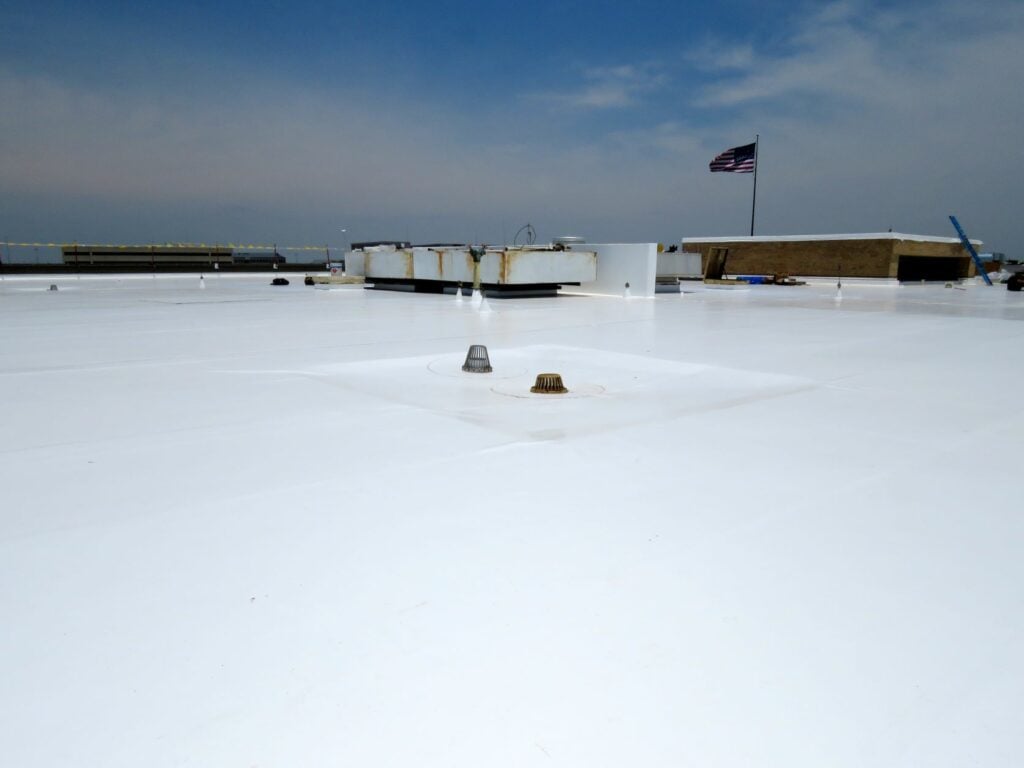PVC Roofing Manufacturers List & Website Directory
By Jack Gray, Roof Online Editor • Last updated August 6, 2024
Return to the Roofing Manufacturer Directory Index

PVC (polyvinyl chloride) roof membranes are a type of thermoplastic single-ply roofing material that is currently the third most popular material used on low-slope (flat) roofs in North America. Made from a specially formulated blend of polyvinyl chloride, plasticizers, stabilizers, fillers, and pigments, PVC membranes are designed for durability and flexibility. A PVC roof membrane consists of a reinforcement mat sandwiched between two layers of flexible PVC sheet. PVC roofing is typically white, reflective, and will qualify as “cool” roofing. It is known for its strength, ease of installation, and resistance to various environmental factors such as water, grease, chemicals, and UV radiation.
Key aspects of PVC roof membranes:
- Durability: PVC roofs are known for their durability and their ability to last for many years with minimal maintenance. These membranes are exceptionally resistant to punctures, tears, and impact damage, making them more suitable for areas with heavy foot traffic than the more popular TPO or EPDM membranes.
- Chemical Resistance: PVC membranes are resistant to a wide range of chemicals, making them a good choice for installations where exposure to oils, greases, and certain industrial chemicals is expected. PVC membrane is a top choice for roofs over restaurants where exhaust fans might deposit kitchen grease on the roof. PVC is, however, highly susceptible to damage if brought into contact with asphalt; asphalt-based roofing materials should never be used to repair a PVC roof.
- Waterproofing: PVC sheets are joined together by heat welding the seams, which means that the roof membranes do not rely on adhesives and (if properly installed) are not vulnerable at the seams. This helps prevent leaks and leads to an outstanding ability to resist water; PVC membranes are often used as pond liners.
- Fire Resistance: PVC roofing materials are fire-resistant and the membrane should stop burning if the source of the flame is removed.
- Energy Efficiency: PVC membranes are typically manufactured to be highly reflective (most are a bright white), which can help reduce the building’s cooling costs by reflecting sunlight and reducing heat absorption. A PVC roof is normally considered a “cool roof”, and building owners may use a PVC roof to qualify for LEED credits.
- Environmental Impact: PVC contains a large amount of chlorine, which may be an issue when it comes time to dispose of old material. The plasticizers used to keep the material flexible also migrate out of the membrane slowly over time and small amounts of these chemicals may end up in the local environment. On the bright side, some PVC membranes are manufactured to be recyclable (but this can vary significantly between manufacturers).
Why Finding a Reputable Manufacturer is a Good Idea:
- Quality Assurance: A reputable manufacturer will adhere to strict quality control standards, ensuring that their product is of high quality, free from defects, and performs as expected.
- Warranty Support: Reputable manufacturers usually offer comprehensive warranties that cover both the material and, in some cases, the workmanship of the installation. A good warranty can give you peace of mind and even increase the value of your roofing asset if you sell the building.
- Technical Expertise: Established PVC roofing manufacturers will have technical departments that have the expertise to provide guidance on the best practices for installation, maintenance, and repair, which can help you get the most out of your roof.
- Qualified Contractors: Reputable PVC roofing manufacturers will typically only sell their products to roofing contractors that they have trained or examined for qualification, and will provide you with a list of approved, certified contractors in your area.
- Product Innovation: Leading manufacturers invest in research and development, resulting in product improvement over time. In the context of PVC roofing, the development and implementation of a new plasticizing agent called KEE, which has a much lower rate of migration out of the membrane, is an example of this.
- Compliance with Standards: Reputable manufacturers ensure their products meet or exceed industry standards and comply with building codes and other regulations.
Choosing a high-quality PVC roof membrane from a reputable manufacturer is an important first step toward ensuring the longevity and performance of your roofing system.
*****
If you are a reputable and qualified PVC roofing manufacturer and feel that we’ve overlooked your company, feel free to contact us to ask to be added to this list.
PVC Roofing Manufacturers List
- Carlisle SynTec
- Custom Seal Roofing
- Duro-Last Roofing, Inc.
- FiberTite (Seaman Corporation)
- Flex Roofing Systems
- GAF Materials Corporation
- IB Roof Systems
- Johns Manville, Inc.
- Mule-Hide Products Co., Inc.
- Sika Sarnafil
- Span Systems, Inc. – PVC tensile fabric structures
- Versico